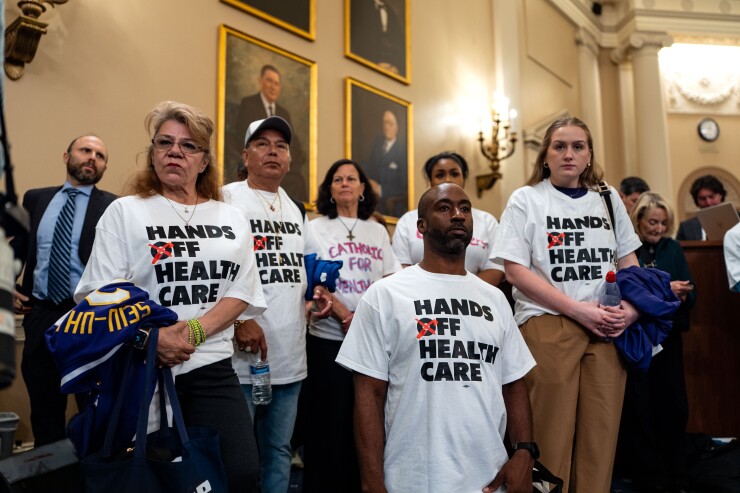A Republican plan to cut $250 billion in Medicaid and other health-care spending hit a procedural roadblock in the Senate Thursday, complicating efforts to pass Donald Trump's massive tax and spending package.
The Senate's legislative rules-keeper judged a series of key health care provisions in the legislation ineligible for a special procedure Republicans are using to bypass the Senate's normal process so they avoid making concessions to Democrats.
Senate Republican leaders are working to re-fashion the provisions to comply with the rules and believe they will be able to restore many of the cuts, according to people familiar with the effort. But the rewriting could take time and delay plans to begin votes on the legislation on Friday.
Senate Parliamentarian Elizabeth MacDonough ruled ineligible provisions that would have limited states' ability to tax health care providers to help fund Medicaid, the insurance program for low-income and disabled people, and penalized states for using their own funding to provide health coverage to undocumented immigrants.
The ruling, announced by Senate Democrats Thursday morning, is likely good news for HCA Healthcare Inc. and Tenet Healthcare Corp., as hospitals were facing potential cuts to Medicaid funding.
Shares of HCA rose as much as 3.9% and Tenet rose as much as 4.9% following the news of the parliamentarian ruling.
Ron Wyden of Oregon, the top-ranking Democrat on the Senate Finance Committee, estimated that the spending cuts ruled ineligible totaled $250 billion and blasted Republicans for attempting to "capture ideological trophies that will leave Americans worse off."
Republicans have said previous parliamentarian rulings on food stamps and other provisions have already threatened to strike more than $300 billion in cuts.
The ruling could solve one problem for GOP leaders in that it would render moot objections from senators like Susan Collins of Maine, Thom Tillis of North Carolina and Josh Hawley to Medicaid provider tax cuts. Hospitals have lobbied aggressively to stop the provisions.
Brian Blase, president of the conservative think tank Paragon Health Institute and a former Trump White House official, criticized provider taxes as "corporate welfare," and said former President Joe Biden supported eliminating them.
"I trust Senate Republicans will find a path forward to make these provisions that reduce the provider tax scam compliant with their parliamentary rules," Blase said.
The ruling, however, exacerbates Senate Majority Leader John Thune and House Speaker Mike Johnson's problem wooing conservatives already angry over the price tag of the bill. Senator Ron Johnson had already said Wednesday his bloc of conservatives had the votes to delay the bill later into July to hammer out more cuts.
Hardline conservative House members such as Chip Roy and Ralph Norman said Wednesday they were already prepared to block the Senate bill if it did make it back to the House.
The House version of the provider tax provision, which is less aggressive than the Senate's draft, would have saved the federal government $89 billion over a decade, according to congressional budget analysts.
Hawley said he talked to Trump and the president agrees that freezing provider taxes, as was done in the House bill, is a better idea than cutting them.
The ruling has already fueled calls from House conservatives for the Senate to overrule the advice of the parliamentarian. Thune has said that he doesn't favor that since allowing non-budgetary matters into the fast-track legislative process would erode the Senate filibuster.
The parliamentarian also rejected attempts to change cost sharing in Obamacare and stop Affordable Care Act plans from covering abortion services.






